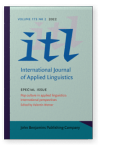Introduction
Pop culture in applied linguistics
International perspectives
Article outline
- 1.Introduction
- 2.Defining pop culture
- 3.Previous research on pop culture in language-educational contexts
- 4.Summary of the contributions
- 5.Concluding remarks
- Acknowledgments
-
References
References (42)
References
Arnold, J. L., & Herrick, E. (Eds.). (2017). New ways in teaching with music. TESOL Press.
Bennett, P. A. (2019). The effects of music in the foreign language learning classroom. Relay Journal,
2
(1), 6–16. 

Benson, P., & Chik, A. (Eds.). (2014). Popular culture, pedagogy and teacher education. Routledge. 

Currie, D. H., & Kelly, D. M. (2022). Pop culture and power: Teaching media literacy for social justice. University of Toronto Press. 

De Wilde, V., Brysbaert, M., & Eyckmans, J. (2020). Learning English through out-of-school exposure: Which levels of language proficiency are attained and which types of input are important? Bilingualism: Language and Cognition,
23
(1), 171–185. 

Duff, P. A., & Zappa-Hollman, S. (2013). Using popular culture in language teaching. In C. Chapelle (Ed.), The encyclopedia of applied linguistics (pp. 5997–6002). Wiley-Blackwell. 

Giroux, H. A., & Simon, R. I. (Eds.). (1989). Popular culture, schooling and everyday life. Bergin & Garvey.
Grau, M. (2009). Worlds apart? English in German youth cultures and in educational settings. World Englishes,
28
(2), 160–174. 

Hagood, M. C., Alvermann, D. E., & Heron-Hruby, A. (2010). Bring it to class: Unpacking pop culture in literacy learning. Teachers College Press.
Hofmann, J. (2018). Pixar films, popular culture, and language teaching: The potential of animated films for Teaching English as a Foreign Language. Global Studies of Childhood,
8
(3), 267–280. 

Kim, Y. (Ed.). (2021). The soft power of the Korean Wave: Parasite, BTS and drama. Routledge. 

Liu, Y., & Lin, A. M. Y. (2017). Popular culture and Teaching English to Speakers of Other Language (TESOL). In S. L. Thorne & S. May (Eds.), Language, education and technology (pp. 87–101). Springer. 

Marsh, J. (2008). Popular culture in the language arts classroom. In J. Flood, S. B. Heath, & D. Lapp (Eds.), Handbook of research on teaching literacy through the communicative and visual arts (pp. 529–536). Lawrence Erlbaum.
Maudlin, J. G., & Sandlin, J. A. (2015). Pop culture pedagogies: Process and praxis. Educational Studies,
51
(5), 368–384. 

McKee, A. (2022). “Popular culture” in popular culture: Academic and vernacular usage. Annals of the International Communication Association,
46
(1), 19–29. 

Merskin, D. (2008). Popular culture. In W. Donsbach (Ed.), The international encyclopedia of communication. Wiley-Blackwell. 

Miller, T. (2015). Introduction: Global popular culture. In T. Miller (Ed.), The Routledge companion to global popular culture (pp. 1–10). Routledge.
Montero Perez, M. (2022). Second or foreign language learning through watching audio-visual input and the role of on-screen text. Language Teaching,
55
(2), 163–192. 

Odo, D. M. (2021). Examining the influence of English songs on English L2 lexical learning: A quantitative meta-analytic review. Language, Culture and Curriculum. 

Page, M. A. (2012). Popular culture: The new literacy challenge for English teachers. The English Journal,
102
(2), 129–133.
Pavia, N., Webb, S., & Faez, F. (2019). Incidental vocabulary learning through listening to songs. Studies in Second Language Acquisition,
41
(1), 745–768. 

Peters, E., Noreillie, A.-S., Heylen, K., Bulté, B., & Desmet, P. (2019). The impact of instruction and out-of-school exposure to foreign language input on learners’ vocabulary knowledge in two languages. Language Learning,
69
(3), 747–782. 

Peters, E., & Webb, S. (2018). Incidental vocabulary acquisition through viewing L2 television and factors that affect learning. Studies in Second Language Acquisition,
40
(3), 551–577. 

Queen, R. (2015). Vox popular: The surprising life of language in the media. Wiley-Blackwell.
Reinhardt, J. (2019). Social media in second and foreign language teaching and learning: Blogs, wikis, and social networking. Language Teaching,
52
(1), 1–39. 

Rose, H., & Galloway, N. (2019). Global Englishes for language teaching. Cambridge University Press. 

Rothoni, A. (2017). The interplay of global forms of pop culture and media in teenagers’ “interest-driven” everyday literacy practices with English in Greece. Linguistics and Education,
38
1, 92–103. 

Rothoni, A. (2019). Teenagers’ everyday literary practices in English: Beyond the classroom. Palgrave Macmillan. 

Summer, T. (forthcoming). Pop culture in English language education: From theory to practice. Erich Schmidt Verlag.
Tegge, F. (2018). Pop songs in the EFL classroom: Time filler or teaching tool? ELT Journal,
72
(3), 274–284. 

Weinstock, Jeffrey A. (2022). Pop culture for beginners. Broadview Press.
Werner, V. (2018). Linguistics and pop culture: Setting the scene(s). In V. Werner (Ed.), The language of pop culture (pp. 3–26). Routledge. 

Werner, V. (2019). Lyrics and language awareness. Nordic Journal of Modern Language Methodology,
7
(1), 4–28. 

Werner, V. (2020a). “Song-advantage” or “cost of singing”? A research synthesis of classroom-based intervention studies applying lyrics-based language teaching (1972–2019). Journal of Second Language Teaching & Research,
8
(1), 138–170. 

Werner, V. (2020b). TV discourse, grammaticality, and language awareness. TESL-EJ,
24
(3). 

Werner, V. (2021a). Text-linguistic analysis of performed language: Revisiting and remodeling Koch & Oesterreicher. Linguistics,
59
(3), 541–575. 

Werner, V., & Tegge, F. (2021a). Learning languages through pop culture/learning about pop culture through language education. In V. Werner & F. Tegge (Eds.), Pop culture in language education: Theory, research, practice (pp. 3–30). Routledge. 

Werner, V., & Tegge, F. (Eds.). (2021b). Pop culture in language education: Theory, research, practice. Routledge. 

Westphal, M. (2021). Pop music and Teaching English as an International Language. In M. Callies, S. Hehner, P. Meer, & M. Westphal (Eds.), Glocalising Teaching English as an International Language: New perspectives for teaching and teacher education in Germany (pp. 181–197). Routledge. 

Wood-Borque, P. (2022). Compiling a corpus of audiovisual materials for EFL learning: Selection, analysis, and exploitation. Profile: Issues in Teachers’ Professional Development,
24
(1), 125–141. 

